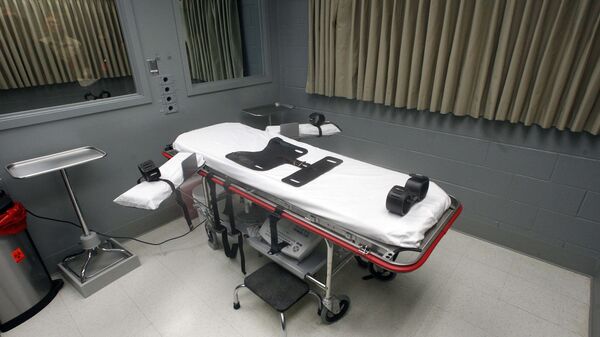In the lawsuit filed on Tuesday, Fresenius Kabi alleges that the state's supply of potassium chloride is stored in 30-milliliter vials and that it is the only company to store the drug in vials of that size. Fresenius also claims that it produced cisatracurium besylate, the second out of four drugs which Nebraska plans to use for the execution. The state dismisses the allegations and intends to go ahead with the upcoming execution.
The judge will take a decision on the matter later in the day.
US Only Western Country Applying Death Penalty
It surprises many Europeans, because the death penalty is forbidden in the European Union, but capital punishment is and remains a legal penalty in the United States, currently used by 31 out of 50 states, the federal government and the military.
READ MORE: Catholic Church Announces Death Penalty Inadmissible
The United States is the only Western country currently applying the death penalty and no president has so far dared to seriously raise the issue.
The country is one of 54 nations worldwide applying it, and was the first to develop lethal injection as a method of execution, which has since been adopted by five other countries.
In 1972, the US Supreme Court struck down capital punishment statutes in Furman vs. Georgia, reducing all death sentences pending at the time to life imprisonment.
Since then, a majority of US states passed new death penalty statutes and more than 7,800 defendants have been sentenced to death. More than 2,900 are still on death row, waiting for the electric chair or a lethal injection.
Case May Delay First Nebraska Execution Since 1997
Fresenius Kabi vs. State of Nebraska may delay the execution of Carey Dean Moore, who was sentenced to death by lethal injection for murdering two cab drivers back in 1979, Janet R. Bancroft, a public information officer at the Nebraska Supreme Court in the capital city of Lincoln, said.
"This case has acquired a lot of visibility, since it is the first application of the death penalty in Nebraska since 1997. The lawsuit, introduced by the German firm (Fresenius Kabi vs. State of Nebraska — Department of Correctional Services, Scott Frakes) could delay the execution of Carey Dean Moore, scheduled for Tuesday August 14. He was sentenced to death by lethal injection for killing two Omaha cab drivers in 1979. Moore has stopped fighting the state's efforts to execute him and wants to die," Bancroft told Sputnik.
Bancroft noted that the case in question was a federal case, not a state one.
"The German company Fresenius is accusing the state of purchasing the drug illegally; what the state denies. This is one of the key elements of the case," he summed up.
Nebraska State Says Drugs Purchased Legally
Nebraska's Attorney General Office insisted in a statement that the drugs for the lethal injection "were purchased lawfully" and were in accordance with the state's "duty" to carry out capital punishment sentences.
READ MORE: Erdogan Ready to Approve Law on Death Penalty if Passed by Parliament
The state's Department of Correctional Services, however, has not said who supplied the drugs.
Nebraska Governor Pete Ricketts stressed that the "plan is to continue forward with the execution next week," as quoted by The Lincoln Journal Star.
So, the Nebraska governor and the public prosecutor remain firm: the prisoner must be executed, while the German company, whose American subsidiary is based in Illinois, says that the execution can be postponed and that their chemicals should not be used.
Fresenius Cocerned About Reputational Damage
In Germany and the United States, the corporate communication service confirms the request introduced in the US. The release published on Thursday by Matthew R. Kuhn, Senior Director, External Communications and Government Relations of Fresenius at their US headquarters in Illinois states that "Fresenius Kabi understands the state of Nebraska may have acquired quantities of the company's potassium chloride and cisatracurium from an unauthorized source, or sources, and that the state intends to use the medication in an execution next week."
"While Fresenius Kabi takes no position on capital punishment, we strongly object to the use of our products for this purpose. Our products were developed and are approved solely for patient care, and we expressly restrict the sale of our products for use in lethal injection procedures. Our information indicates no sales of either potassium chloride or cisatracurium — neither directly nor through any of our authorized distributors — to the Nebraska Department of Correctional Services. That is, we made no sales to the Department of Correctional Services, nor have any of our authorized distributors. So we can only conclude Nebraska may have acquired this product from an unauthorized seller," the release read.
The company, however, is relatively ill at ease in its explanations in the complaint, declaring that "Fresenius is not opposed to the death penalty. It takes no position but opposes the use of its products in executions and does not sell certain drugs to correctional facilities."
According to the company, it has specific distribution controls for eight products that have been identified for possible use in executions. Those include cisatracurium and potassium chloride. It sells those products to a limited number of wholesalers and distributors contracted to abide by requirements not to sell them to prisons, other distributors, retailers or other resellers, or transfer in any way.
The drug manufacturer also said that it learned in 2015 that one of its distributors had mistakenly sold potassium chloride to the Nebraska Department of Correctional Services and requested at that time that it be returned.
The whole situation has prompted some anti-death penalty groups and activists to speak out.
"It is good news that Fresenius filed the complaint. Their name and the mission of the company are very important, and the court should consider that, as other courts have done," Omaha Sen. Ernie Chambers from the Democratic Party said, as quoted by the Omaha World-Herald.
Nebraska has joined other states in the legal wrangling with drug companies seeking to prevent the use of their products in executions. A Nevada execution, for instance, was recently delayed after Alvogen, a US pharmaceuticals company, filed a lawsuit against the state for the use of one of its drugs in a pending execution.
Nebraska's longest serving death row inmate Moore could see once more his execution postponed.
The views and opinions expressed by the contributors do not necessarily reflect those of Sputnik.




